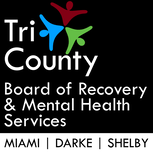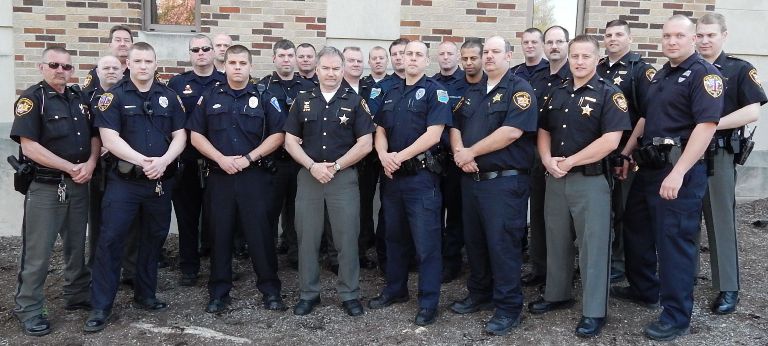|
Monday June 2, 2014
12:00 Noon to 1:00PM Troy Daily News 224 S. Market St., Troy OH, 45373 NAMI (National Alliance for Mental Illness) Ohio invites area residents to visit the NAMImobile at the Troy Daily News on June 2, 2014 from Noon to 1:00PM as part of the 2014 statewide mental illness anti-discrimination press tour. Over the summer the NAMImobile is planning to visit communities throughout the state. For this tour NAMI Ohio is sending its 31-ft NAMImobile RV to local newspaper offices to gain attention and work with local boards and NAMI affiliates to start a community conversation. A goal of the tour is to help dispel the myths about mental illness while highlighting the services available locally. The purpose of the tour is to end discrimination against individuals living with mental illness and their family members by getting the facts about mental illness out to the public. Discrimination is a major barrier to people seeking help for their mental illness when they need it. Lack of treatment can result in hospitalization, loss of employment, court involvement, homelessness or worse, death. The May meeting of the Tri-County Board of Recovery and Mental Health Services has been moved to May 28. The Finance Committee meeting has also been moved, and will precede the full Board meeting. The full Board will convene at 6:45 PM in the Marianne Helmlinger Board Room at Tri-County's offices, 1100 Wayne Street, Suite 4000, Troy.
Tri-County Board Executive Director Mark McDaniel spoke before the County Auditors Association of Ohio Southwest District meeting May 16, 2014, in Urbana. McDaniel shared a brief history of county-based mental health and addictions services boards, and reviewed recent and ongoing legislative and funding challenges the boards face, challenges common to county and local governments.
The Shelby County Drug Free Coalition is promoting a community-wide forum on the effects of heroin on the body, the mind, and on the community, May 22 from 6-8 PM at the Sidney Police Department, 234 W. Court Street, Sidney. The event is sponsored by Wilson Memorial Hospital, the Sidney/Shelby County Chamber of Commerce, Shelby County Counseling Center, and the City of Sidney.
Scheduled presenters are Dr. David McDonald, Wilson Memorial Hospital; Sidney Police Detectives White and Wesbecher; and Ed Crum, MRC & LICDC, Shelby County Counseling Center. There is no fee to attend. However, reservations are required. Email [email protected]. Download the flier here. Dear Miami, Darke and Shelby County Community Partners,
I am asking each of you to take a moment to contact Senator Bill Beagle and Senator Keith Faber to express concern about the Mid-biennium Budget Review (MBR) and its potentially devastating impact on local behavioral health services. With the current budget proposals the Tri-County Board will face a $669,000 shortfall on July 1, 2014. The Governor’s budget “review” removed $47.5 million that was allocated to local Boards for the biennium; removed $20 million in Substance Abuse Prevention and Treatment (SAPT) dollars to help the State with cash flow issues; and withdrew $10.6 million in Hot Spot funding that will be redistributed to just a few select counties instead of all. Most of these funds would be redistributed to fund statewide projects and initiatives and will not come to the local system. Many reports have incorrectly described this as “new” money being invested into behavioral health services, but in fact it is a redistribution of dollars from local authorities to the State. The Ohio House of Representatives recently passed a version of the MBR budget closely following HB 369, sponsored by Rep. Robert Sprague (R-Findlay). This opiate treatment bill starts from good intentions – to address the problem of opiate addictions in Ohio - but follows the same approach of redirecting existing funds, rather than appropriating additional money to address the problem. The House version redirects the $47.5 million into regional crisis centers and housing. It puts $5 million towards the $20 million SAPT reduction. But the most concerning of all is that it changes the language in the Ohio Revised Code to alter ORC 340 (the section that authorizes counties to establish boards to oversee and prioritize behavioral health services) to force this behavioral health section to become an opiate service priority. The bill mandates that a spectrum of opiate-centered services must be created in each Board area and that opiate-centered services must be given priority status above mental health and all other addictions and recovery services. Many groups are now raising concern that because of the funding reductions to the local systems, Boards will have to liquidate mental health and other addictions services to meet this mandate. The argument we have received from some legislators and state officials is that local Boards and communities will be “made whole” with the funding saved through Medicaid Expansion. Our budget projections do not show that this is the case. So, please, take a moment to contact your Senator and express concern that these budget proposals will put our local system at risk of dismantling important programming. Some talking points you may wish to use: · The Tri-County Board initiated a 3-year strategic plan in January which has resulted in the expansion of many services: the Board has provided funding to establish residential and detox services for those with addictions; trained staff in Mental Health First aid; established a guardianship program; expanded the payeeship program; and has increased access to hospital beds. All of these initiatives are at risk. · The strategic plan was the result of planning and discussion with individuals throughout the Miami, Darke and Shelby County area. Local communities’ priorities are being ignored at the expense of State priorities. · Ask your Senator to keep the $47.5 million in local Board budgets and to provide funding to offset the cash flow issues in the SAPT funds. · If the heroin epidemic is a real priority, then the legislature should add “real” new resources to the fight, rather than play shell games that threaten the foundation of locally-prioritized mental health, addictions, recover and prevention services. This matter is urgent – the Senate may act within days. Please call or write now. Thank you, Mark McDaniel Executive Director Senator Bill Beagle, Senate District 5 (Miami, Southern Darke) Senator Keith Faber, Senate District 12 (Shelby, Northern Darke) Sample language: Dear Senator, I am asking you to oppose several measures related to the Mid-Biennium Budget Review bills that, if implemented as they stand now, would have devastating effects on the behavioral health system in Darke, Miami and Shelby Counties. I am asking that you act to restore $47.5 million in funding to local behavioral health boards as originally budgeted for the Biennium, and that you allocate sufficient dollars to address cash flow in Substance Abuse Prevention and Treatment. In addition, while I agree that heroin and other opiates pose a real threat to our area, it is not appropriate to turn the existing behavioral health system into an “opiates first” system; please oppose any change to ORC 340 that would restrict or direct local mental health and addictions boards on how to prioritize local services. Thank you for hearing my concerns. While results are unofficial until certified by the various boards of election, all four county mental health and addiction services levies on the Ohio May ballots appear to have passed with comfortable margins.
Three of the four measures were new levies, and one was a renewal.
The Tri-County Board serving Darke, Miami and Shelby Counties operates with a 0.6 mill, 5-year levy. It was last renewed by voters in 2011, for the 2012-2016 period. The levy generates approximately $2.3 million per year, almost one-third of the Board's annual revenue. Twenty three law enforcement officers from Darke, Miami and Shelby Counties completed the Crisis Intervention Team Academy April 28-May 1, presented by the Tri-County Board of Recovery and Mental Health Services.
Crisis Intervention Team (CIT) Training is a nationally recognized program that teaches law enforcement safe and effective approaches to handling crisis incidents involving a mentally ill individual. The intensive 4-day training is conducted under the instructional supervision of local CIT-trained police officers, mental health professionals, consumers, and family advocates and offers practical techniques for de-escalating crisis situations. CIT Coordinator Jodi Long, Director of Clinical Services and Planning for the Tri-County Board, said, "The CIT Academy and the companion courses have been extremely successful. Officers tell us they now feel better equipped to handle calls involving mental health crises, and those of us involved with mental health services have a better understanding of what the law enforcement officers deal with in the field." The class of 2014 is the ninth law enforcement group to complete the program in the Tri-County Board's service area, bringing the total number of trained officers to 173. The training is underwritten by the Tri-County Board's mental health levy, by grants from the Ohio chapter of the National Alliance for Mental Illness, and by in-kind donations of food by local vendors. The Tri-County Board also presents CIT companion courses for mental health professionals, dispatchers, and teachers, among other groups. For more information about the CIT Academy or companion courses, see the Tri-County Board's website at www.mdsadamhs.mh.state.oh.us/community |
AuthorBrad Reed is Director of Community Resource Development at the Tri-County Board of Recovery and Mental Health Services. Archives
May 2023
Categories
All
|
24-Hour Crisis Hotline 800.351.7347
If you or someone you know is in crisis and needs help,
call the Tri-County CRISIS Hotline 800.351.7347 The 24-Hour Crisis Hotline serves residents of Miami, Darke, and Shelby counties in Ohio. In crisis but can't talk? Crisis Text Line Text 4Hope to 741741 Suicide and Crisis Lifeline Call or Text 988, chat at 988lifeline.org |

Tri-County Board of Recovery & Mental Health Services
1280 N. County Road 25A, Suite #1 Troy, OH 45373 937.335.7727 | FAX 937.335.8816 Email us at [email protected] M-F 8:00AM - 4:30PM. Closed federal holidays. Services provided are funded in whole or in part by your continued support of the Tri-County Mental Health Levy.
The Tri-County Board of Recovery and Mental Health Services is an Equal Opportunity Employer |



 RSS Feed
RSS Feed